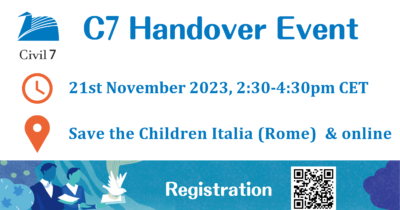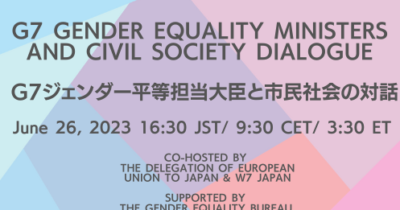 On 19-21 May 2023, the G7 Leaders’ Meeting was held on Ujina Island in Hiroshima, Japan. Global health agenda was mentioned in paragraphs 33-35 of the G7 Leaders’ Communiqué, whose paragraphs 33-35 refer to “Health”, and the document “The G7 Hiroshima Vision on Equitable Access to Infectious Disease Crisis Response Medicines and Other Products” was also released. See the link for the G7 Hiroshima Summit Overview.
On 19-21 May 2023, the G7 Leaders’ Meeting was held on Ujina Island in Hiroshima, Japan. Global health agenda was mentioned in paragraphs 33-35 of the G7 Leaders’ Communiqué, whose paragraphs 33-35 refer to “Health”, and the document “The G7 Hiroshima Vision on Equitable Access to Infectious Disease Crisis Response Medicines and Other Products” was also released. See the link for the G7 Hiroshima Summit Overview.
The C7 (Civil 7) Global Health Working Group has issued a first statement evaluating these documents.
While commending the comprehensive and inclusive description of Global health issues in the G7 Hiroshima Leaders’ Communiqué and other documents, the C7 Global Health Working Group pointed out that the G7’s proactive political and financial commitments are not clear, and that the policies and initiatives that the G7 is trying to launch are all incomplete and are half-hearted. The G7 is also asked to clarify the process going forward.
Regarding the framework for fair access to pandemic-related medicines, we also express concern that technology transfer and technology sharing, especially to the Global South, has been limited to “voluntary cooperation” by companies and others, and call for more active efforts to achieve equitable access.
Click for the PDF file of the First Statement (English / Japanese)
Initial Response of the Delegation of the Civil-7 Global Health Working Group on the G7 Leaders Communique (the Section on Global Health) and “G7 Hiroshima Vision for Equitable Access to Medical Countermeasures”
May 20, 2023
At the G7 Hiroshima Summit, held on Ujina Island in southern Hiroshima from May 19 to 21, the G7’s Leaders Communique, whose 33rd to 35th paragraphs were devoted to global health, and the “G7 Hiroshima Vision for Equitable Access to Medical Countermeasures” were released on May 20. The Civil- 7 Global Health Working Group would first like to commend the G7 Leaders for adopting a communiqué that touches on global health in a comprehensive and exhaustive manner at the G7 Hiroshima Summit, following the G7 Health Ministers’ Meeting held in Nagasaki one week before the Hiroshima Summit. We would then like to draw your attention to the following points.
1. Equitable Access to Medicines for Infectious Disease Crisis (MCM)
The “G7 Hiroshima Vision for Equitable Access to Medical Countermeasures” (hereinafter referred to as the “MCM Vision”) clearly states that the G7 will strive to establish an “end-to-end” global MCM ecosystem and achieve equitable access to MCMs, taking lessons from the COVID-19 outbreak. It also explicitly recognizes that countries that have experienced inequitable access to MCM have a leading role in designing their own response to the pandemic. However, the next paragraph defines this “ecosystem” as relying solely on “voluntary cooperation.” Herein lies a major pitfall.
In our experiences of COVID-19, the transfer of technology and inexpensive distribution of vaccines and other medicines developed with massive public funds to developing countries are left to the “voluntary cooperation” of pharmaceutical companies in developed countries that hold intellectual property rights. This issue, combined with the “vaccine nationalism” of developed countries that hoarded huge amounts of vaccines, impeded the achievement of “equitable access” for all countries including to the Global South. As a result, the “comprehensive waiver of intellectual property rights related to COVID-19” was proposed at the World Trade Organization (WTO) by up to 65 countries as co-sponsors. In addition, technology transferring and sharing to the Global South, and strengthening the manufacturing capacity of MCM at the regional level, were recognized as the biggest common agendas for “pandemic preparedness and response,” which the G7 also recognized. The Global South does not seek “charity” from the Global North. What they seek is the right and agency to protect the health of their own people from pandemics, through technology sharing and strengthened manufacturing capacity. If the G7 is to extol the “leading role” of each country including the Global South in designing national level responses and ownership in pandemic preparedness, the “end-to-end” MCM ecosystem must include more active technology transfer and technology sharing mechanisms, including comprehensive waiver of intellectual property rights, at least for those MCMs developed with public funds, to make them global public goods.
Equitable access to medicines and the MCM ecosystem are currently being discussed in the negotiations of the WHO CA++ and the amendment of the International Health Regulations, as well as in the WHO and G20 negotiations to create a successor framework to the ACT Accelerator, which was organized during the COVID-19 pandemic. The G7 should not limit the basis of this “ecosystem” to “voluntary cooperation.” On the other hand, paragraph 35 of the Communiqué states that the G7 will establish the “MCM Delivery Partnership for Equitable Access (MCDP)” based on this MCM Vision. The G7 needs to clarify the details of this “partnership” as soon as possible. The same paragraph also pledges that the G7 will work with development finance providers “this summer” on concrete measures to ensure the financial liquidity of international organizations to provide MCM at an early stage in the health crisis. This also needs clarified, including in relation to the G20 Finance and Health Ministers’ Meeting and the G20 Health Ministers’ Meeting to be held in August.
2. Global Health Architecture and UHC
Paragraph 33 of the G7 Hiroshima Communiqué mainly describes the global health architecture. While the comprehensive and exhaustive description is commendable, it seems that the content is either a reaffirmation of previous commitments or a pledge without sufficient specificity. The document also postpones and shows a lack of commitment in “surge financing” measures in the event of a pandemic. It is unfortunate that the G7 Hiroshima Summit was held in mid-May, more than a month earlier than last year’s G7 Summit, leaving an insufficient preparation period to formulate multilateral shared initiatives in a sustainable and predictable manner, even for the G7. Given the importance of the G7 in shaping global issues, we must ensure that the date of the G7 Leaders’ Summit allows for sufficient maturation of initiatives. We must also ensure clarifications of processes of initiatives following the summit. On the other hand, we commend the inclusion at the end of the paragraph that recognizes the role of civil society in health, and we reaffirm our commitment to work with the G7 for a healthier future for all.
Paragraph 34 of the G7 Hiroshima Leaders’ Communiqué primarily discusses Universal Health Coverage (UHC). Compared to the Nagasaki G7 Health Ministers’ Communiqué and the G7 Global Plan of Action for the UHC Action Agenda released at the same time, the Hiroshima Communiqué seems to be a setback to the perspective of health as a human right and the “leave no one behind” principle of UHC that focuses on the most vulnerable communities. Additionally, there are no mentions of gender inequalities in accessing health services. While statements of ending AIDS, TB, and malaria and the 7th replenishment of the Global Fund (Global Fund to Fight AIDS, TB, and Malaria) are commendable, as in the Nagasaki G7 Health Ministers’ Communiqué, there are insufficient descriptions of Non- Communicable Diseases (NCDs) or Neglected Tropical Diseases (NTDs). There is also a serious and total absence of issues that urgently need to be addressed, including the need to promote comprehensive sexual education, and the mental health of young people. The statement that the G7 will make a “total financial contribution of $48 billion” to achieve UHC has various challenges such as the absence of its timeframe, the inclusion of the private sector in the specified pledge amount, and the ambiguity of the G7’s renewed financial contributions. Concerning the G7’s financial contributions, pledges must be more transparent and responsible. In the last part of paragraph 35, we commend the detailed discussion around dementia, and call for more active multilateral policy and financial mobilization toward increased equitable access to medicines, health and care related to aging, in light of the current accelerated aging of the world population.
Ends




